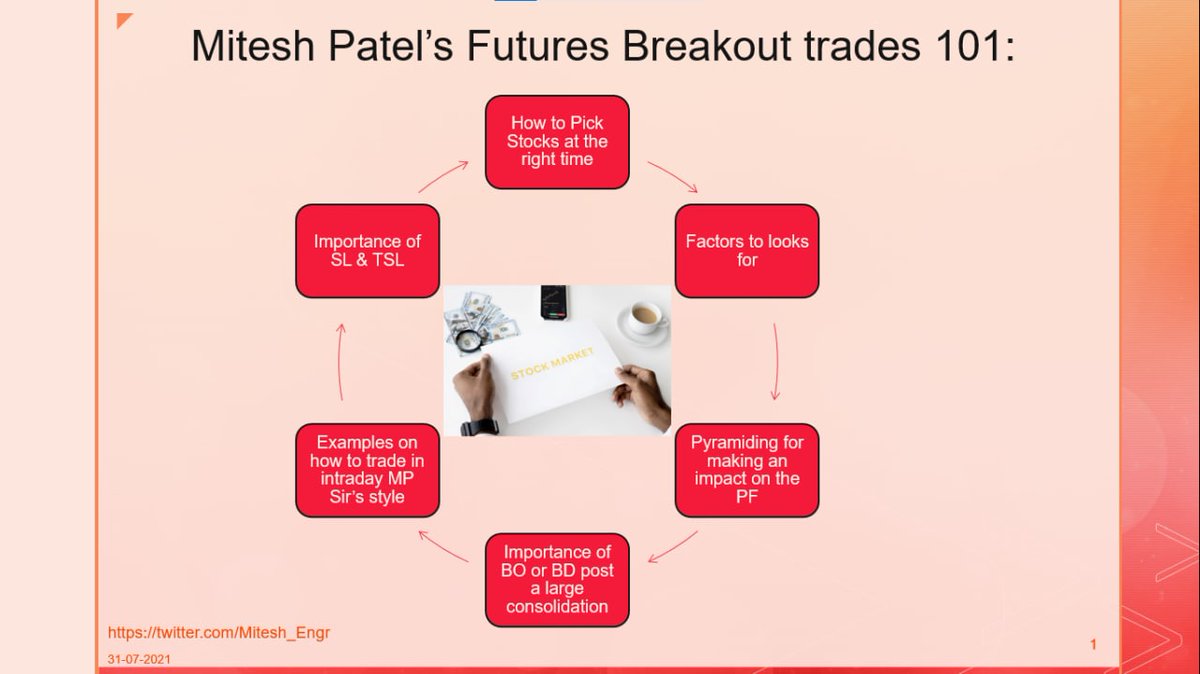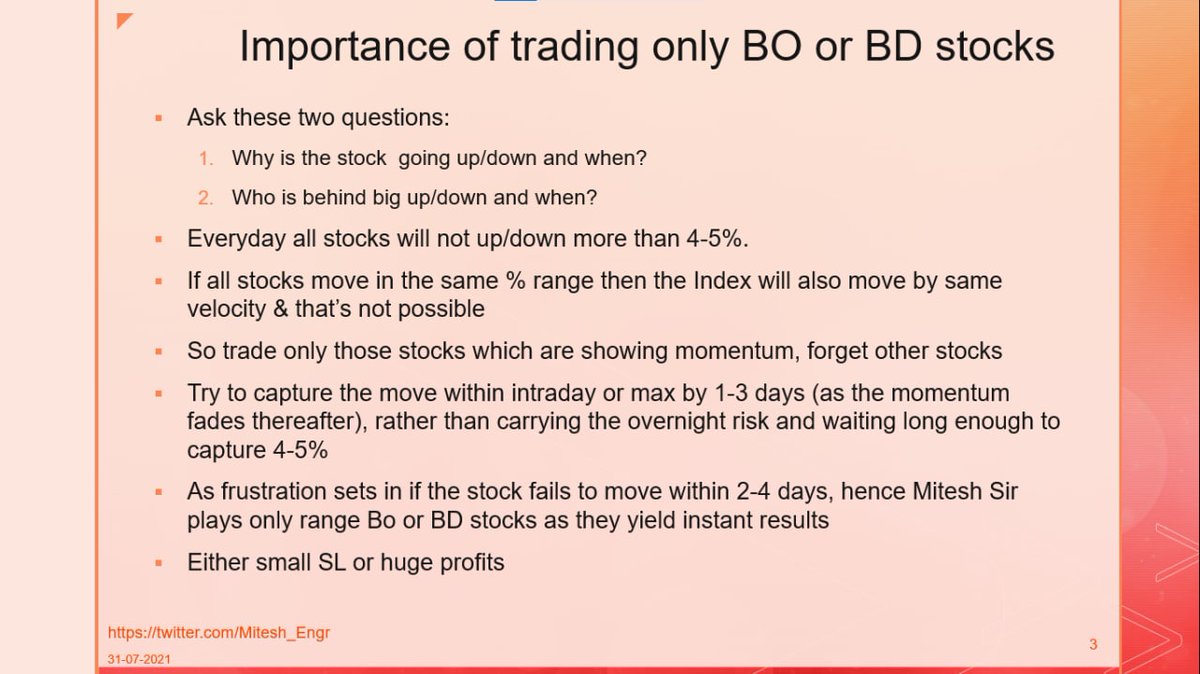When costs are reduced, margins and profits increase.
Interpretation of Financial Statements - preliminary filters.
1. Looking for sustainable competitive advantage:
When looking for sustainable moat, you wanna see consistency - in earnings, in having low debt, in having growing earnings, low spending in capital expenditures, etc.
When costs are reduced, margins and profits increase.
Let's take a look at Apple:
i) You want to see earnings grow at a steady pace. Take a look at the net income below.

As a thumb rule, Warren Buffett wants to see a gross margin of around 40% or above.
Although not quite 40%, it's around that range with respect to Apple.

Samsung's gross margins are around similar range, highest being 45.7% in 2018, and Huawei had a gross margin of 38.6%.

Gross margin = (revenue - cost of goods sold) / revenue
Net margin = net income / revenue.
You want to see the company having higher net margin compared to their competitors.
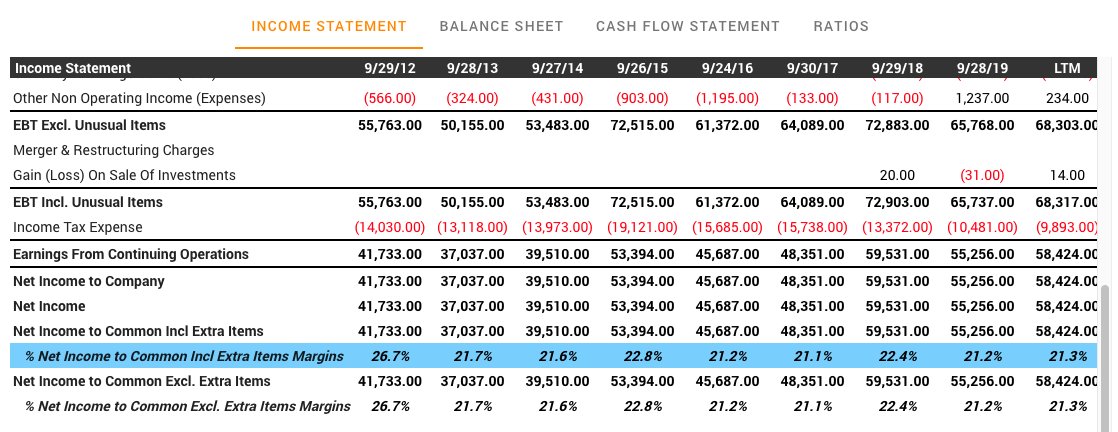
Typically, net margin above 20% is a very strong one, indicating that we are dealing with a smoothly run business.
Look at the figure - "Retained Earnings".
Using retained earnings, you can find out if a company is reinvesting its income or not. A steady growth in this number means the business is profitable, and that it's identifying good investing opportunities.
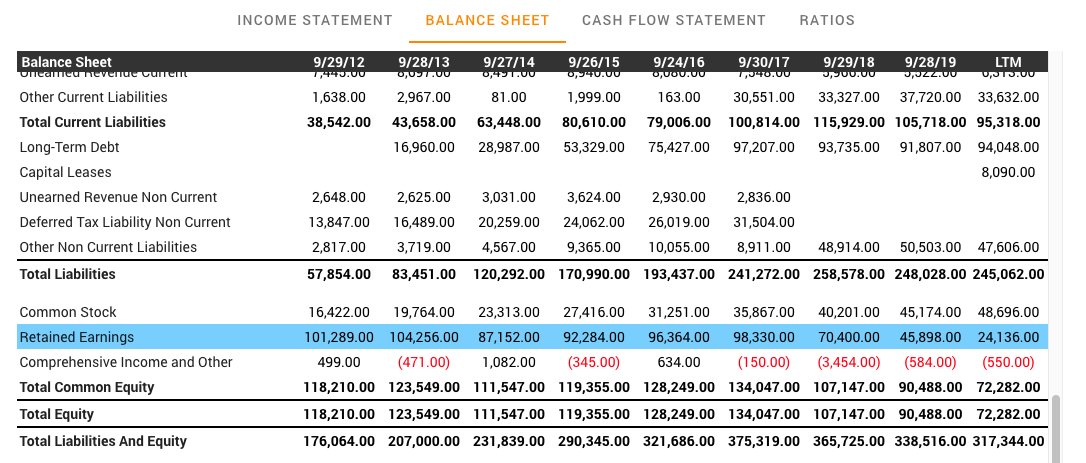
To measure how efficiently a company is using these retained earnings, Return on Equity (ROE) is used.
Apple looks quite strong in this aspect. It's partly an effect of distributing a lot of their earnings to shareholders. It also signifies the sustainable competitive moat.

4) Exceptional businesses seldom require a lot of debt to expand (except maybe banks/NBFCs). Instead, they can just use the strong cashflow from the business.
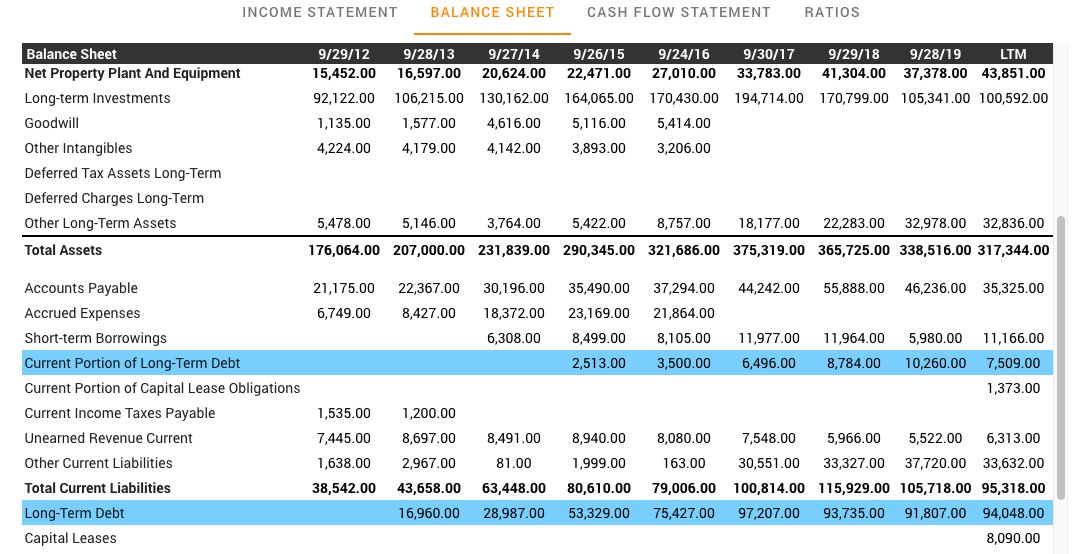
This is where you see the actual in's and out's of money.
Look at "Capital Expenditures" on the cashflow statement.
This is the money being spent on properties, plant, and equipment.
Exceptions: One time payment to grow the business in some capex activity.

3 instances when you could consider selling the stock.
i) You need money for a better investments. This is more so applicable in a bear market, for you to switch from something great to something exceptional.
This may not always apply to all markets, all stocks. But with anything above 40PE, tread carefully and cautiously.
- Competitive advantage and scale
- Consistently high net income, return on equity
- Requires very little debt
- Retained earnings has steady growth
- Capital expenditures should be < 25%
- Sell a company if prices are crazy, or a better opportunity comes up.
https://t.co/nbKA5Bzpi6
https://t.co/MbmUKsE968
More from Shravan Venkataraman 🎡
Have you ever had 4-5 profitable trades in a row, and you bet all your profits on your next trade feeling "in the zone" only to lose it all?
That's called as "hot-hand fallacy" bias.
I ran a poll recently to outline two classic biases we have as humans.
Thread below 👇👇
1/ *Hot-Hand Fallacy* first had its origin in the game of basketball.
If a player shoots few baskets in a row, people generally predict that the next shot will also be a basket.
This is ignoring the fact that each shot is independent of the ones that came prior.
2/ In this poll, 41.1% people voted that the batsman who hit 4 sixes in a row, will hit a sixer in the 5th ball also.
This is classic hot-hand fallacy.
Each ball's outcome is independent.
The probability is not 50% FYI (number of outcomes is not 2).
These 148 people who voted that the next ball will also be a sixer, did so because they believe that the batsman is on a hot streak, and that his streak would continue.
This is an emotional bias and is usually attached to human performance related events only.
3/ 45.3% (162) people voted that the 5th ball would be a dot ball, meaning the batsman wouldn't score anything.
These people displayed the classic "negative-recency" bias, which is also called the "Gambler's Fallacy".
That's called as "hot-hand fallacy" bias.
I ran a poll recently to outline two classic biases we have as humans.
Thread below 👇👇
Let's say you see a cricketer hit four 6's in a row.
— Shravan Venkataraman \U0001f525\U0001f680\U0001f4b0 (@theBuoyantMan) December 30, 2020
If you have to bet on the next ball's outcome, what would you bet on?
1/ *Hot-Hand Fallacy* first had its origin in the game of basketball.
If a player shoots few baskets in a row, people generally predict that the next shot will also be a basket.
This is ignoring the fact that each shot is independent of the ones that came prior.
2/ In this poll, 41.1% people voted that the batsman who hit 4 sixes in a row, will hit a sixer in the 5th ball also.
This is classic hot-hand fallacy.
Each ball's outcome is independent.
The probability is not 50% FYI (number of outcomes is not 2).
These 148 people who voted that the next ball will also be a sixer, did so because they believe that the batsman is on a hot streak, and that his streak would continue.
This is an emotional bias and is usually attached to human performance related events only.
3/ 45.3% (162) people voted that the 5th ball would be a dot ball, meaning the batsman wouldn't score anything.
These people displayed the classic "negative-recency" bias, which is also called the "Gambler's Fallacy".
In today's round up, I have some amazing threads, resources, and plenty of solid advice for business, finance, career from twitter.
Here's the roundup of 17 of the best and the most useful threads, tweets, and resources I found last week. 🧵
1/ How to find spreadsheets on any topic in the
2/ A thread by @wes_kao on making your customers hungry and excited to buy from
3/ Life brings you a lot of afflictions. But if you look around, there's a lot of beauty around you. Most often, drowning in the afflictions, we can't recognise or appreciate the beauty.
@wdmorrisjr wrote a damn good thread on finding beauty around us.
4/ This one is for all the job goers and job seekers.
@SahilBloom who recently hit 500k followers and has several accomplishments to his belt (career wise) wrote this thread on standing out in a hiring
Here's the roundup of 17 of the best and the most useful threads, tweets, and resources I found last week. 🧵
1/ How to find spreadsheets on any topic in the
How to find spreadsheets on any topic in the world:
— Blake Emal (@heyblake) February 13, 2022
1. Go to Google
2. Search site:docs(dot)Google(dot)com/spreadsheets \u201cYOUR TOPIC\u201d
3. Search, scroll, succeed pic.twitter.com/VJsYQKyi0J
2/ A thread by @wes_kao on making your customers hungry and excited to buy from
How to get customers excited, hungry to buy, and ready to say yes:
— Wes Kao \U0001f3db (@wes_kao) February 13, 2022
3/ Life brings you a lot of afflictions. But if you look around, there's a lot of beauty around you. Most often, drowning in the afflictions, we can't recognise or appreciate the beauty.
@wdmorrisjr wrote a damn good thread on finding beauty around us.
You\u2019re not looking for more success, stuff, or sex.
— David Morris (@wdmorrisjr) February 13, 2022
You\u2019re searching for beauty.
Here\u2019s how to find it: \U0001f9f5
4/ This one is for all the job goers and job seekers.
@SahilBloom who recently hit 500k followers and has several accomplishments to his belt (career wise) wrote this thread on standing out in a hiring
10 ways to stand out in a hiring process (that don\u2019t involve your resume):
— Sahil Bloom (@SahilBloom) February 13, 2022




















